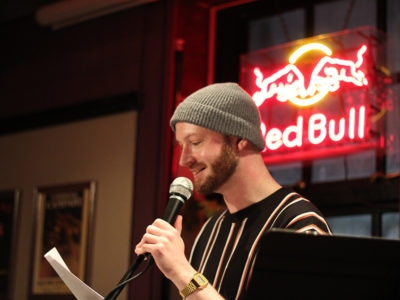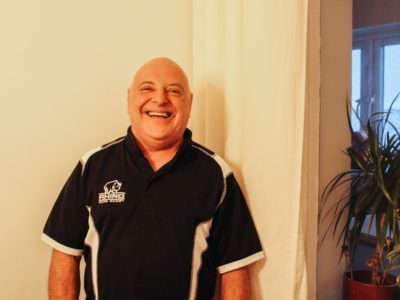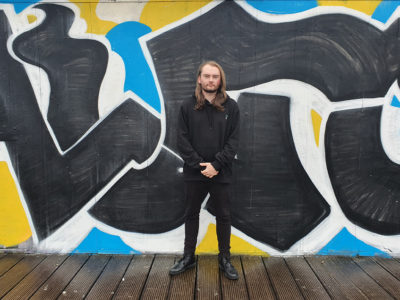Contact
Susan Richardson has a personal website with more information, future gigs and contact details, as well as a blog. She can be emailed for queries, bookings and queries on books. She is also on Twitter as @susanpoet.
Poetry
Examples of her poetry can be read in Horizon Review, Poemeleon and Tattoo Highway.
Video
You can watch Susan reading a poem from Creatures of the Intertidal Zone here:
[youtube width=”236″ height=”200″]http://www.youtube.com/watch?v=keH0_VFfo-s[/youtube]
A peek inside how an ecopoet finds inspiration in Cardiff
It’s so early in Chapter Arts Centre café that it’s another ten minutes until breakfast can be ordered. It’s Saturday morning, but Susan Richardson is already here. As an ecopoet, her work has taken her around the world, whether through pilgrimages to the Arctic or via the airwaves as a resident poet on BBC Radio 4’s Saturday Live. So, a café might not seem so green or glamorous – there isn’t even a pot plant inside – but she’s early and excited for a workshop in performance. “It’s nice to be a participant,” she says, “because I’m usually the person teaching it.”
Susan says she’s very much a morning person, particularly from 4am onwards. “It’s closer to that sleepy, dreamy subconscious state,” she explains. The early rises might be the secret behind her productivity: poetry, plays, short stories, travel writing, tutoring and even availability as an after-dinner poet.
In particular, she’s excited about returning to the Arctic. Her first trip was funded by a Churchill Memorial Travel Fellowship. “I followed in the footsteps of an intrepid eleventh century Norse woman who was born in Iceland, moved to Greenland and then set up a settlement in Newfoundland. I spent time in her birthplace, Snaefellsnes Peninsula – a long arthritic finger jutting out into the North Atlantic.”
Susan was born in the less polar environment of Monmouthshire in 1968, but now lives in Cardiff, still away from wilderness. “It doesn’t have to be the Arctic. I walk the dog twice a day through Pontcanna Fields and Llandaff Fields. Me and my partner decided we don’t want children, but we have a dog that takes up rather a lot of time.”
Her mother never wanted her to be a writer. “I think she was scared that I would never make a proper living from it. When my mother died, it was quite a moment.” She pauses. “She wanted me to go into something much more conventional. My first collection came out after she died, so I feel sad she never got to see I made the right decision.” That collection, Creatures of the Intertidal Zone, was followed by Where the Air is Rarified. On her next project, she teases, “It’s looking at the concept of wilderness and the idea of human-animal transformations.” The writing starts next month.
“I think it has to be equal,” she responds when asked if it’s possible to collaborate with nature. “I find wilderness is what I’m most inspired by, but it’d be impertinent to call it collaboration when I’m really insignificant in comparison with it.”
Nevertheless, Susan’s voice is regularly heard by almost 2 million people on Radio 4’s Saturday Live. She admits, “They’re not expecting complex poetry, so I do more with rhymes and patterns of sounds.” In the show, she performs two poems in response to current events, but the internet gives them a life beyond their topicality. “I love doing it, but it’s not what I want to be remembered by. It’s ironic because they’re the poems that get the biggest audience.”
The internet means it’s easier to find archives or have your voice heard. “It’s definitely democratised it,” she says, quickly adding, “but it might be more difficult to wade through everything that exists.”
Further down the line? “I don’t know if there’ll be poets in several centuries.” This is clearly a topic that bothers her, especially she means it literally. She explains, “I’m quite gloomy about the state of the environment. So many species are dying out with global climate change and I feel our days are numbered. We’re at a dangerous point in our history.”
Until then, she has advice for future writers. “Read as much as you can. There are people writing poetry who don’t read poetry. They don’t want to think about tradition – they often write prose and chop it up into lines that become poetry. It’s important to know the rules and history of where you’re coming from, but also if you’re going to break those rules and why you’re going to break them.”
She follows her own advice as preparation for her next book involves reading poetry and academic texts, but also shamanic journeying – an ancient tradition that, again, features lots of travelling. She explains, “The shaman would journey to the upper, lower and middle world. I’ve been using it not as a healing method, but a way of getting in touch with the subconscious.”
Unsurprisingly, Cardiff doesn’t feature much in her poetry. “I’ve become more of a wilderness poet since living in Cardiff. I’m reacting against the urbanism of it. I find I go to every green spot imaginable and on the coast whenever possible, as far away from the city.”
On that note, she departs for her workshop, with poetry offering her own escape into the wilderness.
Contact
Susan Richardson has a personal website with more information, future gigs and contact details, as well as a blog. She can be emailed for queries, bookings and queries on books. She is also on Twitter as @susanpoet.
Poetry
Examples of her poetry can be read in Horizon Review, Poemeleon and Tattoo Highway.
Video
You can watch Susan reading a poem from Creatures of the Intertidal Zone here:
[youtube width=”236″ height=”200″]http://www.youtube.com/watch?v=keH0_VFfo-s[/youtube]





